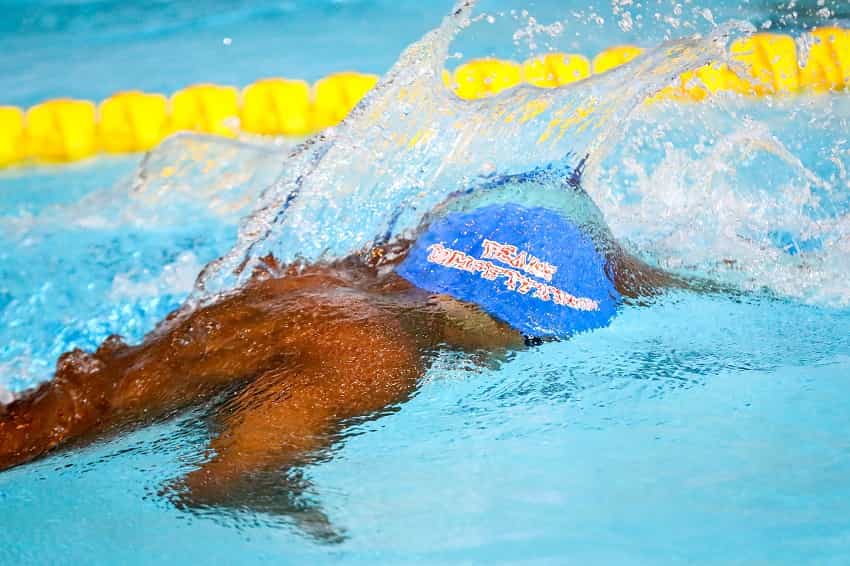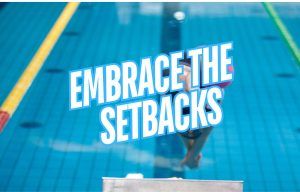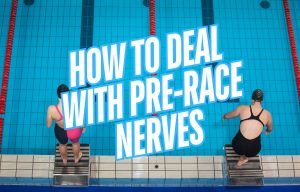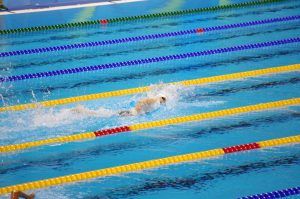
6 Benefits of Visualization for Swimmers
Wondering what visualization can do for your swimming? Here are some evidence-based benefits of visualization for swimmers for more confidence, less choking, and even better technique.

Racing and competition does some funny things to swimmers.
For coaches, it can be wildly infuriating and confounding to watch a swimmer do something one way in practice over and over again, and then do something completely different the moment they get up on the blocks.
For swimmers, it can be equally frustrating and hair-pulling to swim like a potato on race day when all the signs in training were pointing to a killer performance.
Now, there are some obvious factors that can explain why the swimmer that shows up on race day doesn’t mirror the one that worked hard and goes fast at swim practice.
Maybe you didn’t warm up enough. Maybe you were super focused on the shiny new tech suit on the swimmer in the lane next to you. And maybe you were just having a really, really bad day.
But usually, choking, or under-performing on race day, can be traced back to the relationship that we have with pre-race nerves and anxiety.
Here are three fun facts about pre-race nerves and performance anxiety swimmers should know.
Let’s be honest, the experience of pre-race nerves and anxiety is odd.
The physical experience is like a strange mix of having too much coffee, sticking a finger in an electric outlet, and eating food that is well passed its expiry date.
Your hair is tingling, your stomach is doing back-flips, and you feel like there is a slight possibility that your heart is going to leap out of your chest.
But pre-race nerves and performance anxiety are just your classic fight-or-flight response.
And if there is one thing you take away from this fact sheet, it’s this:
Pre-race nerves are a totally normal biological function.
Sure, it might feel weird—the clammy hands, the legs pumping a million miles an hour, the racing thoughts and the relentless peeing.
But this is standard operating procedure for your body.
Pre-race nerves aren’t out to get you.
They are here to help:
Your body knows what it is doing—priming you to swim better and faster than ever.
If only your brain would get out of the way.
Performance anxiety can make us feel like there is something wrong.
And mainly this is because we don’t feel like we are in control of it.
After all, it’s not like we flicked a “boost mode” switch to turn on the physical symptoms of anxiety. They came on by their own accord. The seeming loss of control is what make swimmers panic.
Instead of trying to stomp out your pre-race nerves—and all the glorious physical benefits that comes with them—use it for your benefit.
Something as simple as—and I am not making this up—framing your nerves and anxiety as excitement can seriously improve your performance.
The moment you realize that your body is just trying to hype you up, and not scare the crap out of you, great things begin to happen.
When you acknowledge the anxiety, and stop trying to avoid it or suppress it, you can get motivated to swim better [1].
You aren’t going to get rid of the biological response to stressful situations.
So you might as well use that chlorinated mesh bag of feelings for good!
Suppressing anxiety is one of those things that seem like it should work—if I just try really, really hard to make it go away, it will.
But it won’t. Not in the way most of us do it, anyway.
Which is a perfect, two-handed turn into our third little fun fact…
We have all had a race or twelve where we got lost in a whole bunch of “what ifs” behind the blocks:
We likely know that these thoughts aren’t going to help us swim any better, and yet, as much as we try to punch them out they seem to get louder and louder, until our mind is feels like a Powerball machine, with anxious thoughts clattering around the inside of our heads.
When we try to suppress a thought, whether it’s a fear we have of choking, or worrying about disappointing our parents, it steadily grows louder [2].
Unwanted thoughts can be seriously stubborn, and trying to fight them head-on makes them stronger. It’s like trying to kill Godzilla with nuclear weapons—you just make him louder, bigger and ragier.
The key to working with those normal fears?
Focus on something else.
Yup. I’m being serious.
Shift your attention to your pre-race routine. Focus on counting your breaths. Stick to your performance cues. Stay in the moment.
This kind of process-based thinking is great for maximizing performance anxiety. Instead of being lost in the stuff going around you, or what might go wrong, you are forcing yourself to stay engaged with the moment.
Instead of trying to stop your feelings of performance anxiety, have a game plan for staying present and focused on the moment.
Pre-race nerves and performance anxiety are something we all deal with on some level.
Even elite, college-level swimmers struggle with maintaining a proper perspective on performance anxiety. When I did a little survey with four NCAA teams, 42% of them admitted to feeling scared behind the blocks.
This isn’t the perspective you need to swim fast and enjoy the competitive experience.
To repeat…
Performance anxiety is normal.
Recognize that it’s part of the deal. That it’s trying to help you out. That you can channel it productively by reminding yourself that it’s a performance booster. And that staying engaged and present will help you make the most of them.
This Mental Training Workbook Will Help You Swim Like a Rock Star This Season. Confused about mental training? Want to unleash pro mode on your swimming this year? Learn how this mental training workbook will change your mindset and help you pummel your PB’s this season.
Why You Should Be Grading Your Effort After Practice. One of my favorite ways to stay consistent and accountable in practice is this simple technique. Takes about three seconds, and will keep you honest about the effort in the water.
Image credit: JC Mouton

Olivier Poirier-Leroy Olivier Poirier-Leroy is the founder of YourSwimLog.com. He is an author, former national level swimmer, two-time Olympic Trials qualifier, and swim coach.
✅ Free shipping on Orders over $49
✅ Price Match Guarantee
✅ Best selection of gear for training and competition
✅ Fast and Easy Returns

“This is the best book I have ever seen concerning mental training.” — Ray Benecki, Head Coach, The FISH Swim Team


Wondering what visualization can do for your swimming? Here are some evidence-based benefits of visualization for swimmers for more confidence, less choking, and even better technique.

Ready to uncork some best times at your next swim meet? Here’s what you need to know to prepare for a swim meet.

The right mental skills can help you unlock faster swimming on race day. Here is a look at the right skills to use for competition.

Frustrated with setbacks in the pool? Here are some tips for improving your ability to embrace setbacks and swim faster.

Struggling to swim fast under pressure? Here are some tips for how to manage pre-race nerves on race day.

Swimmers often find themselves stuck with doubt when it comes to doing tough things in the water. Here’s a simple question to ask when you find doubt and uncertainty stopping you from excellence.
SITE
SHOP
GUIDES

LANE 6 PUBLISHING LLC © 2012-2025
Join 33,000+ swimmers and swim coaches learning what it takes to swim faster.
Technique tips, training research, mental training skills, and lessons and advice from the best swimmers and coaches on the planet.
No Spam, Ever. Unsubscribe anytime.
